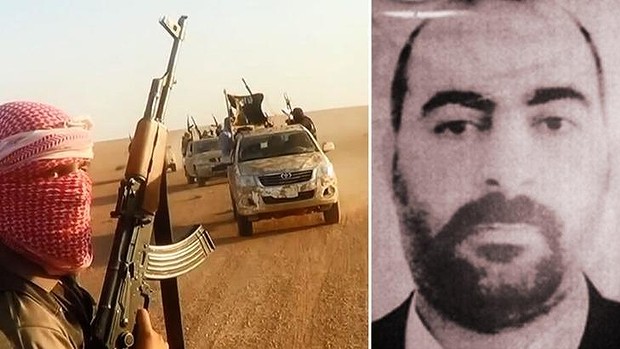Three years after American troops left Iraq, a militia led by "the world's most dangerous man" is descending on its capital, Baghdad.
The Islamic State of Iraq and Syria (ISIS) has taken over a number of Iraqi cities in just 48 hours. More than 500,000 refugees fled Iraq's second-largest city, Mosul, as it was seized by rebel forces on Tuesday. Since, they have proceeded southward through the cities of Baiji and Tikrit, just 130km from Baghdad.
The world is yet to solidify its response but early indications are the US will offer some form of assistance to Iraq. The insurgents' success calls into question the viability of both the Iraqi government and military since American withdrawal three years ago. It also leaves many wondering what happened to a country that was supposed to be liberated by US and Coalition intervention.
The Islamic State of Iraq and al-Sham (greater Syria) is a jihadist group that originated from al-Qaeda in Iraq (AQI). It is frequently called the Islamic State of Iraq and the Levant (ISIL), this being another term for the greater Syrian region encompassing Lebanon, Palestine and Jordan.
While the group is often and correctly described as "al-Qaeda linked", they do not stand side by side. Al-Qaeda has its own Syrian offshoot, Jabhat Al-Nusra, and al-Qaeda head Ayman al-Zawahiri has denounced ISIS and its leader, Abu Bakr al-Baghdadi (full name Ibrahim Awwad Ibrahim Ali al-Badri).
Al-Baghdadi was an AQI commander who evaded US capture in Iraq and later moved into Syria. There has been a $US10 million bounty on his head since 2011, and Time magazine labelled al-Baghdadi "the world's most dangerous man",
ISIS fighters are a major component of the rebels fighting Bashar al-Assad's regime in Syria. The Economist has described the group as "one of the best-equipped and funded militias on the ground", with perhaps 7000 fighters.
It is a hardline, Sunni Muslim militia that kills civilians without much care. Its brutality has alienated ISIS from other rebels fighting the Assad regime. It seeks a single Islamic state under Sharia law, not just in Syria but across the Levant and in Iraq. On Tuesday it conquered Mosul, Iraq's second-biggest city of almost 2 million, which stands about 114km from the Syrian border in the north of Iraq.
The militia has since advanced another 225km south through Baiji and Tikrit. The New York Times is reporting that militants had by Wednesday night reached the outskirts of Sumarra, the next town south, which is just 130km from the capital, Baghdad.
Could Baghdad fall?
The Iraqi government has acknowledged the fall of Mosul poses a "serious, mortal threat" to the country, but Mr Maliki has vowed to fight until the city is recaptured, arguing ISIS doesn't have the numbers to retain it.
Former US adviser to Iraq's national security council, Raoul Alcala, describes Baghdad as "vulnerable". The capital is heavily fortified but numerous bombings in recent months show it is also infected with rebels who elude capture, he said.
The Iraqi military is large but not effective, and riven by sectarianism and defection. It is expected that government forces will regroup, defend the capital and launch a concerted effort to recapture Mosul and cities in between. But a full-scale and protracted civil war remains a distinct possibility.
What is the likelihood of Western intervention?
The Iraqi government has been attempting to procure additional help from the US for a while. The New York Times is reporting that the Iraqi government requested assistance in the form of airstrikes, including drones, as insurgent attacks escalated over the past month. The White House has not yet confirmed those reports but since the American withdrawal, Mr Maliki's pleas have been largely resisted.
We don't yet know whether the White House will reconsider that stance in the light of ISIS' rapid advance. State Department spokesperson Jen Psaki told media the US will expedite the delivery of crucial weaponry to Iraq. She also indicated further assistance would likely be provided but declined to describe what form that might take.
An early AFP report said the Obama Administration stands ready to offer "any appropriate assistance" to address the security situation.
The UK Telegraph is reporting that British Prime Minister David Cameron has ruled out any military intervention.
What does this mean for the region?
The success of ISIS in Iraq reflects existing problems in the Middle East: sectarianism that is growing stronger as a result of Syria's civil war. Now that ISIS has a strong presence in both countries, that could be an argument for the West taking a greater interest - and playing a more active role - in the Syrian conflict.
At the very least, the conflict will further destabilise the region. Remember, ISIS is interested in more than just Syria and Iraq: al-Sham (or the Levant or greater Syria) includes parts of Jordan, Lebanon, Israel, Palestine and Egypt.
What will this do to oil prices?
Iraq is the second-largest oil producer in the OPEC, and any serious conflict there has implications for the oil market. Prices were flat or slightly up on Wednesday, and trading above $US100 barrel.
There are significant oil fields near Mosul, but the majority of Iraq's oil production takes place in the country's south. Oil minister Abdul Kareem Luaiba has said the southern oil fields are "very safe", but any uncertainty is likely to push up prices regardless.
/129
source :
Thursday
12 June 2014
7:38:53 AM
615386

The Islamic State of Iraq and Syria (ISIS) has taken over a number of Iraqi cities in just 48 hours. More than 500,000 refugees fled Iraq's second-largest city, Mosul, as it was seized by rebel forces on Tuesday.
